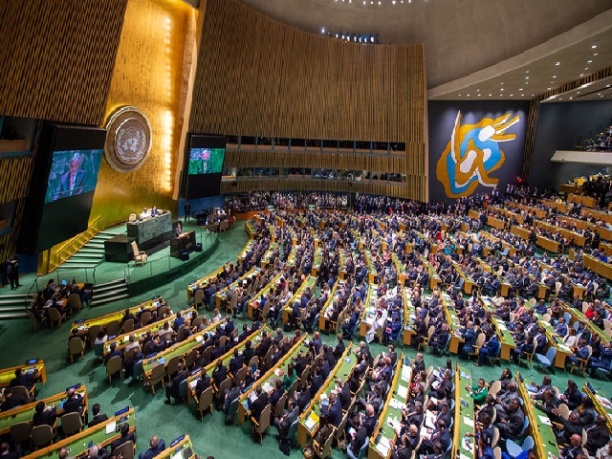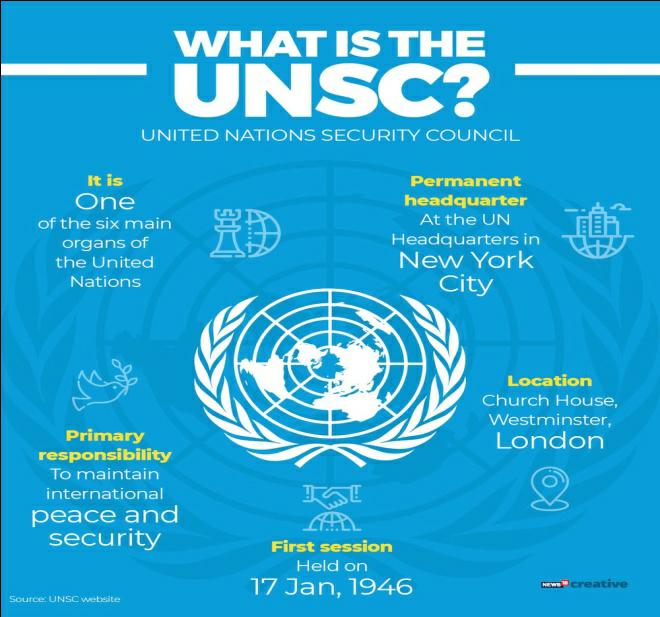
Copyright infringement is not intended
Context: UN General Assembly adopted Veto resolution by consensus as India voices serious concerns about such ‘take it or leave it’ initiatives that do not take into account concerns of the wider membership.
Liechtenstein had asked the UN General Assembly to debate a draft resolution backed by the US -- requiring the five permanent members of the UN Security Council (Russia, China, US, UK and France) to justify their use of the veto.
- Besides the five permanent members, the UNSC also has 10 non-permanent members (including India), who do not have the right of veto.
India and UNSC reforms:
- India has been at the forefront to reform the Security Council, to become a permanent member.
- India has called for reforms in the UNSC, claiming that the body had not been able to fulfill responsibilities in maintaining global peace and security due to "limited representation".
- India -- along with the other G4 countries (Brazil, Germany, and Japan) -- has previously stated that if given a permanent seat on the UNSC, it would not use the veto for a period of 15 years.
- India has repeatedly said that the issue of expanding the UNSC should not be held hostage by the debate over veto power.
What is veto power?
- The UNSC veto power is the power of the five permanent members of the UNSC to veto (strike down) any "substantive" resolution.
- The veto power originates in Article 27 of the United Nations Charter, which states:
- Each member of the UNSC shall have a vote.
- Decisions of the UNSC on procedural matters shall be made by an affirmative vote of nine members.
- Decisions of the UNSC on all other matters shall be made by an affirmative vote of nine members, including the concurring votes of the permanent members.
- This means that a negative vote from any of the permanent members will block the adoption of a draft resolution.
- A permanent member that abstains or is absent from the vote will not block a resolution from being passed.
- Although the "power of veto" is not mentioned by name in the UN Charter, Article 27 requires concurring votes from the permanent members.
- For this reason, the "power of veto" is also referred to as the principle of "great power unanimity" and the veto itself is sometimes referred to as the "great power veto".
- During the negotiations for the formation of the UN at Dumbarton Oaks (August–October 1944) and Yalta (February 1945), the USSR, US, China, UK and France made it clear that there would be no UN if they did not get veto power.
- Ukraine-Russia conflict: UNSC reform has recently gained strength and support from major players after Russia's recent invasion of Ukraine. Moscow's veto power has allowed it to paralyse action in the UNSC, which is supposed to intervene in such conflicts as guarantor of global peace.
The Liechtenstein proposal
- It is co-sponsored by some 50 countries including the United States -- but none of the other four permanent UNSC members.
- It provides for a convocation of the 193 members of the General Assembly "within 10 working days of the casting of a veto by one or more permanent members of the Security Council, to hold a debate on the situation as to why the veto was cast".
- The adoption of the Liechtenstein resolution is a significant step toward the accountability, transparency, and responsibility of all" the permanent members of the Security Council.
- The positions of India, Brazil or South Africa, and other contenders for a potential permanent seat have not yet been revealed.
Arguments for and against the veto
- Supporters of veto power regard it as a promoter of international stability, and a check against "snap" military interventions.
- Critics, say that the veto is the most undemocratic element of the UN, as well as the main cause of inaction on war crimes and crimes against humanity, as it effectively prevents UN action against the permanent members and their allies. For example, the US routinely casts lone vetoes against resolutions criticising Israel.
- The permanent members veto resolutions that criticise their own actions. For ex. In 2014, Russia vetoed a resolution condemning its annexation of Crimea. Most recently, Russia vetoed a resolution condemning its actions in Ukraine.
- Amnesty International claimed that the five permanent members had used their veto to "promote their political self interest or geopolitical interest above the interest of protecting civilians".
What is UNSC?

India at UNSC:
- India has recently taken over the presidency of the United Nations Security Council.
- India began its eighth term as a non-permanent memberof the UNSC on January 1 and will remain as such for a period of two years.
- India's bid for a permanent seat at the UN Security Council has support from four of the five P5 nations, namely the US, UK, France and Russia.
- China is the only permanent memberwhich is yet to officially back India's bid.
Composition of UN Security Council
The UN Security Council is composed of
- 15 members, including five permanent member states - China, France, Russian Federation, the United States, and the United Kingdom - and
- 10 non-permanent member states elected by the United Nations General Assembly (UNGA).
- Each non-permanent member gets the opportunity to work as UNSC president.
- Ten non-permanent members are elected to the UNSC every year for a two-year term. India's current term began on January 1 of this year and will last until December 31, 2023.
- The 10 non-permanent seats are distributed among the regions of the world: five seats for African and Asian countries(three are for Africa and two for Asia), one for Eastern European countries, two for Latin American and Caribbean countries, and the remaining two for Western European and other countries.
- The Africa and Asia Pacific group takes turns every two years to put up an Arab candidate.
How does presidency of UNSC rotate?
- Each non-permanent member gets the opportunity to operate as president of the UN Security Councilduring the two years it is part of the grouping.
- The presidency of UNSC changes hands every month between its membersin the English alphabetical order of the member states' names.
- In August, the presidency was passed on from France to India. Similarly, Ireland is slated to take over the presidency from India in September.
- India will be in line for the presidency again in December 2022.
- The country's last term as a non-permanent member of the UNSC was in 2011-12, which was preceded by stints in 1991-92, 1984-85, 1977-78, 1972-73, 1967-68, and 1950-51.
Powers of the UNSC President
- The presidency derives responsibility from the Provisional Rules of Procedure of the United Nations Security Councilas well as UNSC's practice.
- The holder of the presidency is considered to be the 'face' and spokesperson of the UNSC.
https://theprint.in/world/unga-adopts-veto-resolution-by-consensus-as-india-voices-serious-concerns-about-such-take-it-or-leave-it-initiatives/932279/





